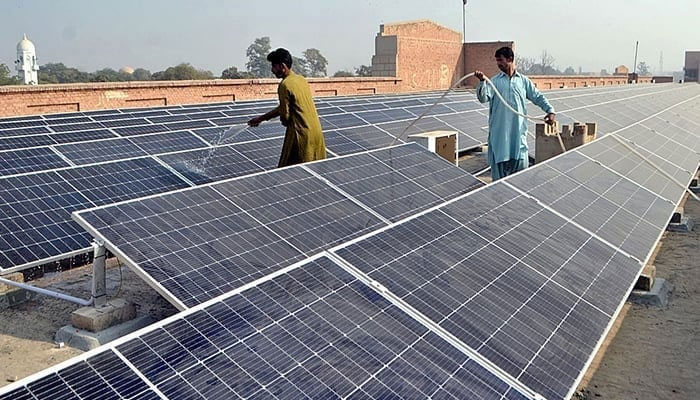Solar initiative
Estimated at Rs55 billion, with the federal government covering 70 per cent of the project’s expenses
Prime Minister Shehbaz Sharif has announced a much-needed scheme for farmers in Balochistan on behalf of the federal and Balochistan governments. Estimated at Rs55 billion, with the federal government covering 70 per cent of the project’s expenses, 28,000 tube wells in Balochistan will be solarized to provide farmers with cheap electricity. PM Shehbaz has said he is confident that Balochistan Chief Minister Sarfraz Bugti will be able to implement the project within three months. He highlighted that these tube wells were connected to the power grid but were barely active for two hours because people don’t pay their bills. Now farmers will be able to use their tube wells at minimal electricity cost since solar is the world’s cheapest power source; this will also save billions of rupees in subsidy to the Quetta Electric Supply Company. This is a step in the right direction for many reasons.
At a time when the entire country is reeling from the budget and the increase in electricity tariffs, this initiative will ensure that 28,000 farmers can survive its effects. Without tube wells, crops were also being affected. Like other sectors, Pakistan’s agriculture sector has also borne the brunt of loadshedding and high electricity prices. That the federal and provincial governments are encouraging farmers to go solar shows that the government wants to provide targeted relief to those affected by the worst. Solar is not just clean renewable energy but something that is needed for a country like Pakistan, which is a victim of climate change. Another reason solar power should be used is that the abundant sunlight will not go to waste while providing great financial relief to these farmers. Such projects should not just be limited to Balochistan, but encouraged elsewhere as well for farmers and regular citizens. Just recently, CM Maryam Nawaz approved providing solar panels to people consuming 50 to 500 units of electricity monthly. Per this policy, 90 per cent of the solar panels’ cost will be paid by the provincial government and 10 per cent by consumers. Reportedly, the Sindh government aims to provide solar systems to 200,000 households across the province. There is consensus across the board that solarization is the way forward. Pakistan has been one of those countries that incentivized solar power and the government is now making use of this renewable energy source to give relief to the masses.
In another move, PM Shehbaz on Tuesday announced that the government will not be increasing the electricity rates for protected customers who consume up to 200 units of power for three months and that they will get a subsidy for July, August and September. These are good steps that will give relief to consumers who are struggling to survive the rising cost of living. Targeted relief for the people will make the lives of the lower-income groups much more bearable. The government should come up with more such initiatives so that those who cannot afford to pay high electricity bills do not live without the bare minimum.
-
 Extreme Cold Warning Issued As Blizzard Hits Southern Ontario Including Toronto
Extreme Cold Warning Issued As Blizzard Hits Southern Ontario Including Toronto -
 Lana Del Rey Announces New Single Co-written With Husband Jeremy Dufrene
Lana Del Rey Announces New Single Co-written With Husband Jeremy Dufrene -
 Ukraine-Russia Talks Heat Up As Zelenskyy Warns Of US Pressure Before Elections
Ukraine-Russia Talks Heat Up As Zelenskyy Warns Of US Pressure Before Elections -
 Lil Nas X Spotted Buying Used Refrigerator After Backlash Over Nude Public Meltdown
Lil Nas X Spotted Buying Used Refrigerator After Backlash Over Nude Public Meltdown -
 Caleb McLaughlin Shares His Resume For This Major Role
Caleb McLaughlin Shares His Resume For This Major Role -
 King Charles Carries With ‘dignity’ As Andrew Lets Down
King Charles Carries With ‘dignity’ As Andrew Lets Down -
 Brooklyn Beckham Covers Up More Tattoos Linked To His Family Amid Rift
Brooklyn Beckham Covers Up More Tattoos Linked To His Family Amid Rift -
 Shamed Andrew Agreed To ‘go Quietly’ If King Protects Daughters
Shamed Andrew Agreed To ‘go Quietly’ If King Protects Daughters -
 Candace Cameron Bure Says She’s Supporting Lori Loughlin After Separation From Mossimo Giannulli
Candace Cameron Bure Says She’s Supporting Lori Loughlin After Separation From Mossimo Giannulli -
 Princess Beatrice, Eugenie Are ‘not Innocent’ In Epstein Drama
Princess Beatrice, Eugenie Are ‘not Innocent’ In Epstein Drama -
 Reese Witherspoon Goes 'boss' Mode On 'Legally Blonde' Prequel
Reese Witherspoon Goes 'boss' Mode On 'Legally Blonde' Prequel -
 Chris Hemsworth And Elsa Pataky Open Up About Raising Their Three Children In Australia
Chris Hemsworth And Elsa Pataky Open Up About Raising Their Three Children In Australia -
 Record Set Straight On King Charles’ Reason For Financially Supporting Andrew And Not Harry
Record Set Straight On King Charles’ Reason For Financially Supporting Andrew And Not Harry -
 Michael Douglas Breaks Silence On Jack Nicholson's Constant Teasing
Michael Douglas Breaks Silence On Jack Nicholson's Constant Teasing -
 How Prince Edward Was ‘bullied’ By Brother Andrew Mountbatten Windsor
How Prince Edward Was ‘bullied’ By Brother Andrew Mountbatten Windsor -
 'Kryptonite' Singer Brad Arnold Loses Battle With Cancer
'Kryptonite' Singer Brad Arnold Loses Battle With Cancer




